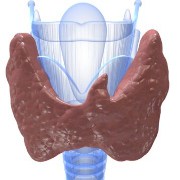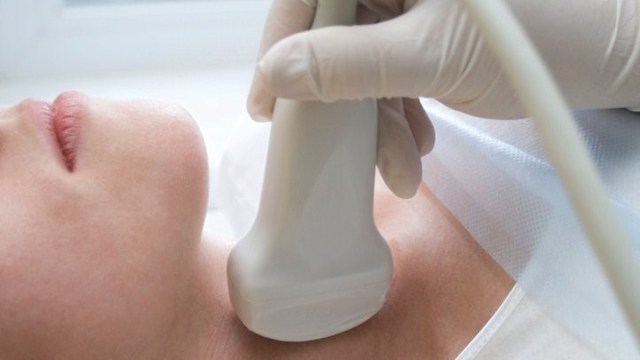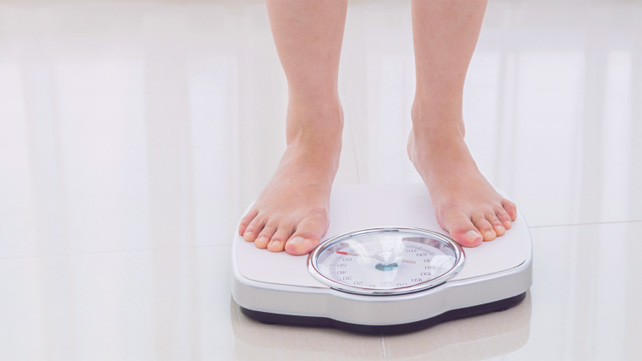 Photo: Getty Images
Photo: Getty Images
The thyroid gland is a butterfly-shaped gland in the neck, lying in front of the trachea and larynx. The gland produces two hormones called triiodothyronine (T3) and thyroxine (T4).
These hormones are responsible for our metabolism (i.e. how you break down food and use energy). In hyperthyroidism, the thyroid releases too much of the hormones.
Symptoms of Hyperthyroidism
An excess of the T3 and T4 hormones can cause:
• Fatigue
• Anxiety
• Frequent bowel movements
• Increased sweating
• Increased appetite
• Intolerance of warm temperatures
• Weight loss
• An enlarged thyroid gland
• Irregular menstrual periods (or no periods)
• Upset stomach
• High blood pressure
• Nausea and vomiting
• Irregular pulse or heartbeat
• Insomnia
• Itching
• In men, breast development
You don’t have to have all of these symptoms to have hyperthyroidism.
What Causes Hyperthyroidism?
The majority of cases of hyperthyroidism are caused by Graves’ disease, an auto-immune disease where the immune system produces antibodies to the thyroid, triggering it to go into overdrive.
Genetic and environmental factors are thought to be responsible for this immune deregulation. It can be hereditary, running in families.
Other factors, such as damage to the thyroid by radiation and certain drug therapies, including HIV treatments, can result in hyperthyroidism. Cigarette smokers also have a two-fold increased risk of the disease.
If you don’t have Graves’ disease, there are other causes, such as inflammation of the thyroid gland (caused by a virus), or inflammation caused by an immune response.
Sometimes women who have just given birth will develop an inflamed thyroid, commonly known as postpartum thyroiditis. Taking too much hormone medication can also trigger hyperthyroidism.
Diagnosis
It is diagnosed by physical examinations and blood tests. The doctor will look for signs of an enlarged thyroid and take a blood pressure reading. He will also take blood to check for elevated levels of T3 and T4, as well as reduced levels of a thyroid-stimulating hormone.
Treatment
The disease can be treated with anti-thyroid medications that reduce the amount of hormones the thyroid is able to release. Other medications, such as beta blockers, can also be given to reduce some of the mood symptoms and heart rate problems associated with the condition. These don’t affect the thyroid directly, just some of the symptoms that its dysfunction causes.
More permanent options for treatment include radioactive iodine and surgery. Radioactive iodine is used to destroy the thyroid.
Surgery is done to remove the thyroid. If you have either of these, you will need to take hormone replacement medication for the rest of your life as these replacement pills will do the job your thyroid would have done.
If your hyperthyroidism is caused by a virus, once you have fully recovered from the virus, the hyperthyroid condition may go away after a few weeks. If it has occurred after childbirth, it will also be temporary.
Sources:
Hyperthyroidism, PudMed Health. Web. 14 January 2012. http://www.ncbi.nlm.nih.gov/pubmedhealth/PMH0001396
Hyperthyroidism, The Hormone Foundation. Web. 14 January 2012. http://www.hormone.org/Thyroid/hyperthyroidism.cfm
Graves' Disease and the Manifestations of Thyrotoxicosis, Thyroid Manager. Web. 14 January 2012.
http://www.thyroidmanager.org/Chapter10/10-frame.htm
Thyroid Problems and Pregnancy, Endocrine Web. Web. 14 January 2012. http://www.endocrineweb.com/conditions/thyroid/thyroid-problems-pregnancy
Joanna is a freelance health writer for The Mother magazine and Suite 101 with a column on infertility, http://infertility.suite101.com/. She is author of the book, 'Breast Milk: A Natural Immunisation,' and co-author of an educational resource on disabled parenting.
Reviewed January 16, 2012
by Michele Blacksberg RN
Edited by Jessica Obert






Add a Comment1 Comments
If you have hypothyroid symptoms and had blood test done for it and they came out normal and the doctor then tells your okay it's normal you can go. That's not solution though is it? I've been going through so much in this matter because I have hypothyroid symptoms myself. I know two doctors by the name of Dr. David Brownstein www.drbrownstein.com and Dr. Jorge Flechas www.helpmythyroid.com. They have talked so much about how thyroid and iodine are important together. I just couldn't believe all the information I got about iodine.
Here is a place to do a self test online if you're a hypothyroid person. http://www.1-thyroid.com/lowthyroid.htm. When I did test my score came out 68. It's saying 68 means severe hypothyroidism.
I heard of something called Kelp (iodine) which is a seaweed and it's a natual supplement for hypothyroidism. The first time I actually took it I couldn't believe later in the afternoon I felt a little bit warm. Generally I'm very intolerant to the cold weather and I know it's one of the symptoms of being hypothyroid. So from this point I decided to see my endocrinologist to be sure exactly how much Iodine I should take.
If any of you have hypothyroid symptoms post your replies here I'd be glad to help.
Melissa
January 20, 2012 - 9:40pmThis Comment